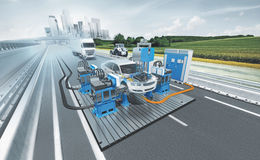The University of Bath’s soon-to-open £70m motor industry global centre of excellence is to collaborate with the world’s largest automotive testing firm to help put the low-carbon car of the future on the road.
The pioneering Institute of Advanced Automotive Propulsion Systems (IAAPS), now under construction on the Bristol & Bath Science Park, has signed the agreement with powertrain testing leader AVL.

The aim is to help accelerate IAAPS’ research into new engine systems and electric vehicles by developing new tools and techniques, putting the centre at the cutting edge of vehicle testing and research.
Austria-headquartered AVL List group is the world’s largest independent company for development, simulation and testing in the automotive industry.
By harnessing the power of AVL’s digital tools, IAAPS engineers will help the auto industry be more flexible and responsive to a rapidly-changing market and legislative landscape
It will collaborate closely with IAAPS on research projects, helping plan future testing equipment, software and techniques, and feed the innovations back into the automotive industry.
AVL will also sponsor 10 PhD candidates within the IAAPS’ Centre for Doctoral training, helping to develop much-needed automotive professionals.
AVL is already a key equipment supplier to IAAPS and has already worked with the Institute’s academics and technical staff to specify and supply state-of-the-art testing equipment to its new centre, which opens this summer.

The centre builds on the institute’s work on innovative technologies to support the automotive industry’s move to ultra-low and zero-emissions vehicles.
IAAPS academic director Prof Chris Brace said: “Clearly this is significant partnership for us.
“Our goal is to be years ahead of what is currently cutting edge, so we didn’t simply want to buy in existing equipment.
“It was important for us to have a truly collaborative relationship with our equipment and software partner to help us achieve our vision of improving on what is state of the art and developing tools and techniques that are beyond those possible today.
“Having a deeply integrated, wide-ranging relationship with AVL allows us to build on the capability we each have, extend it, and go further.”
Prof Brace said using AVL’s latest equipment and software tools would allow IAAPS researchers to explore how digital development, testing and manufacturing planning could help automotive companies and original equipment manufacturers be more responsive to a changing legislative and consumer landscape.
He added: “Digital tools will be crucial to creating a flexible and agile future for the automotive industry, so these are a major element of our research and our work with AVL.”

The partnership will also support another of IAAPS’ key objectives of training of future automotive professionals, as AVL will sponsor the work of at least 10 PhD candidates in its Centre for Doctoral Training.
IAAPS centre manager Yvonne Ascott addd: “This agreement is exciting in many ways, not least AVL’s sponsorship of at least 10 PhD places, and the tight integration between the two organisations that will help our candidates work on tools and techniques that could proliferate within the industry, giving them crucial expertise and a real competitive advantage.”
AVL manager, synergistic methods and tool development, Dirk Denger described the move as the most significant university collaboration AVL had embarked on to date, and to share the ambition and scale of this important research project with its partners in IAAPS was very exciting.
“The relationship will also allow the outcomes of the research by IAAPS to be incorporated into future AVL commercial products, so it’s a unique opportunity to develop new techniques that could make impacts industry-wide,” he said.
“Both IAAPS and AVL are energised by the prospect of involving end-users, such as auto manufacturers and suppliers, in the research, products and services that we develop together.”
AVL is supplying a full suite of state-of-the-art equipment to the facility, including test rigs and chambers that will be able to measure the efficiency and performance of individual parts, motors, engines and even complete vehicles in precise detail.
The IAAPS facility will become one of the world’s most advanced research centres of its type, with existing IAAPS partners including tier-one auto manufacturers set to use the facility to help develop their future vehicles and systems.
The University of Bath is investing £30mil in constructing IAAPS alongside £28.9m from the UK Research Partnership Investment Fund and £10m from the West of England Local Enterprise Partnership’s Local Growth Fund.
University of Bath vice-chancellor and president Prof Ian White said: “AVL has the technical capability to help IAAPS create a world-leading facility that will play a key role in directing the development of the engines, motors and propulsion systems of the future.
“This research collaboration agreement gives both IAAPS and AVL access to the other’s world-class expertise and will bring major benefits in both directions, and to the industry.”
The 13,500 sq m, two-storey building on – which is still on track to open this year – will put the West of England at the centre of research into next-generation ultra-low emission vehicles.


















